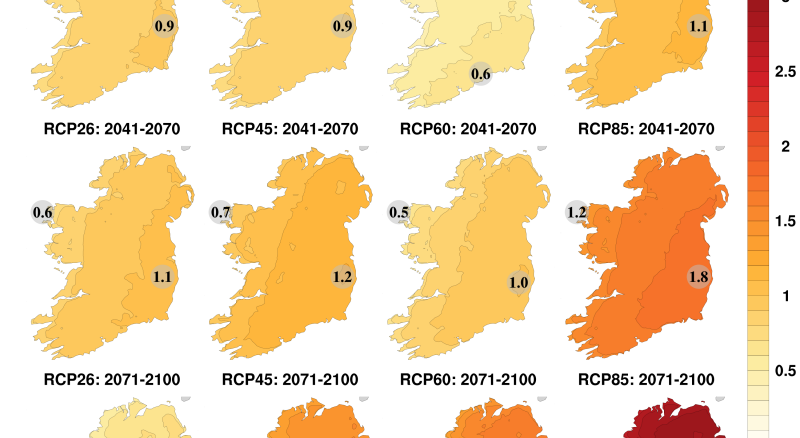
[dropcap]T[/dropcap]he country’s weather conditions and temperature will be radically different by the year 2050, particularly in the east, according to a computer generated projection by the Irish Centre for High-End Computing (ICHEC).
The analysis predicts that in thirty years Irish temperatures will have increased by between 1 and 1.6 degrees Celsius.
Between 30 and 40 additional days of the year will be suitable for growing crops, benefitting farmers although this will be offset by rainfall becoming more could cause difficulty for farmers.
As well as heatwaves, the summer could also mean a decrease in wind at the height of 120 metres above sea-level, where most standard wind turbines are located.
This could be severely detrimental for meeting Ireland’s demand for renewable wind energy.
However, wind at 10 metres above sea-level will increase which could intensify sea level rise and the effect of storm surges on the coast.
‘We find this report from the ICHEC very concerning for the future of wildlife in this country if this comes to pass. We need Ireland to move away from our fossil fuel dependence and we need to stand up to companies who are producing carbon emissions which will eventually lead to extreme biodiversity loss, extreme weather events and the risk of native animal species becoming extinct ,’ Mícheál O’Fuartháin, Vice-Chair of DCU’s Sustainable Living Society, told the College View.
The supercomputer simulation is the most detailed Irish climate change projection ever produced, and also found that bigger populations of mosquitoes and disease-carrying ticks will impact the country by surviving the warmer winters.
Additionally, Ireland will miss its emissions reduction target for this year despite the decrease in fossil fuel use due to the Covid-19 pandemic. This news comes from the annual report of the Climate Change Advisory Council (CCAC), which stated that ‘a green Covid-19 recovery is not only possible but essential.’
O’Fuartháin, of DCU’s Sustainable Living Society had solemn words in response to the report, and the CCAC’s announcement that a radical shift would be needed to meet 2030 emission reduction targets.
“We are immensely disappointed that Ireland has missed our reduction target, however we are not surprised… Countless years of government ignorance has led us to this stage and we hope we can see a major overhaul in how we approach our climate targets in government. We will not stand by and let those at the top single-handedly lead us to the point of no return.”
The RCP numbers on the projection shown represent various outcomes dependent on how much the world’s emissions continue to increase in the future.
Note: This article was originally published on 14/10/2021
Jamie Mc Carron
Image Credit: Irish Centre for High-End Computing



